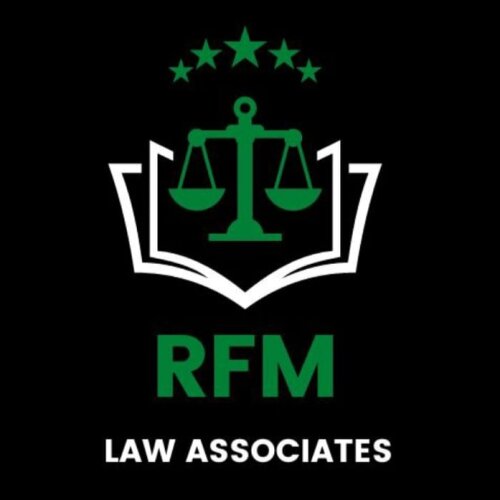Best Military Law Lawyers in Pakistan
Share your needs with us, get contacted by law firms.
Free. Takes 2 min.
Or refine your search by selecting a city:
List of the best lawyers in Pakistan
About Military Law in Pakistan
Military law in Pakistan is a specialized legal field that governs the operations, conduct, and discipline of the armed forces. The governing legislative framework includes the Pakistan Army Act, 1952; the Pakistan Air Force Act, 1953; and the Pakistan Navy Ordinance, 1961. Generally, military law covers issues like court-martials, the rights and responsibilities of service members, military offenses, and administrative procedures specific to military personnel. It overlaps with civilian law in certain respects but also has unique elements designed to maintain discipline and order within the military ranks.
Why You May Need a Lawyer
Individuals involved with military institutions in Pakistan may require legal assistance for various reasons. Common scenarios include being charged with a military offense, facing a court-martial, dealing with administrative actions such as discharge proceedings, or needing representation in complaints of discrimination or harassment within the military. Military personnel might also seek advice on the benefits or rights granted to them and their families. A lawyer experienced in military law can help navigate these complex procedures, ensuring that the individual’s rights are protected under the law.
Local Laws Overview
Military law in Pakistan is deeply intertwined with the structure and discipline of the country's armed forces. Key aspects include the classification of military offenses which can range from absence without leave, insubordination, to more serious crimes like desertion or espionage. The judicial system within the military involves court-martial processes with its own set of procedures distinct from civilian courts. Furthermore, military personnel are subject to jurisdiction under military law regardless of where the alleged offense occurred. It is critical to understand the distinct processes and penalties under this framework versus civilian judicial alternatives.
Frequently Asked Questions
What is military law?
Military law is a specialized legal system designed to govern the behavior of members of the military. It includes legal procedures and penalties unique to the armed forces.
How is military law different from civilian law?
While there are overlaps, military law differs from civilian law in its procedures, penalties, and scope. Military law maintains discipline within the armed forces and includes offenses that are specifically pertinent to military operations and conduct.
What is a court-martial?
A court-martial is a military court or a trial conducted in such a court to determine the guilt of members of the armed forces subject to military law, with penalties ranging from imprisonment to discharge.
Who can be tried under military law?
Military law applies to military personnel both during active service and in some cases even after discharge, particularly if offenses occurred during their time in service.
What are common military offenses?
Common military offenses include desertion, insubordination, mutiny, absence without leave (AWOL), and conduct unbecoming of a soldier.
Can civilians be subject to military law?
Civilians are generally not subject to military law; however, in specific circumstances such as when accompanying the armed forces in a warzone, exceptions can occur.
Can I appeal a court-martial decision?
Yes, there are provisions to appeal court-martial decisions through hierarchical military appellate courts, culminating in the appellate jurisdiction of the respective service chiefs.
What rights do military personnel have under military law?
Military personnel have rights similar to civilians, such as the right to legal representation and a fair trial, though these are navigated within the military justice system’s specifics.
Are there legal protections for discrimination or harassment in the military?
Yes, there are protections against discrimination and harassment within the military structure, but these are adjudicated through military administrative bodies and policies.
How do I find a lawyer specializing in military law in Pakistan?
Seek referrals from military legal aid branches, consult with bar associations, or contact legal firms known to specialize in military law cases for advice and representation.
Additional Resources
The following resources can be valuable for those seeking help or information regarding military law in Pakistan:
- The Judge Advocate General's (JAG) Department - Offers legal aid and resources within the military structure.
- Legal Aid Offices within Military Installations - Provide initial advice and guidance.
- Bar Associations - Can refer qualified lawyers specializing in military law.
- The Ministry of Defense - Regulatory oversight and additional support structures.
Next Steps
If you require legal assistance in military law, the following steps might be helpful:
- Assess your situation and gather all relevant documentation related to your legal issue.
- Reach out to your unit's legal representative or the JAG office for preliminary advice.
- Consult with a lawyer specializing in military law to understand your options and potential outcomes.
- Remain informed about your rights and responsibilities as you navigate the military legal system.
Lawzana helps you find the best lawyers and law firms in Pakistan through a curated and pre-screened list of qualified legal professionals. Our platform offers rankings and detailed profiles of attorneys and law firms, allowing you to compare based on practice areas, including Military Law, experience, and client feedback.
Each profile includes a description of the firm's areas of practice, client reviews, team members and partners, year of establishment, spoken languages, office locations, contact information, social media presence, and any published articles or resources. Most firms on our platform speak English and are experienced in both local and international legal matters.
Get a quote from top-rated law firms in Pakistan — quickly, securely, and without unnecessary hassle.
Disclaimer:
The information provided on this page is for general informational purposes only and does not constitute legal advice. While we strive to ensure the accuracy and relevance of the content, legal information may change over time, and interpretations of the law can vary. You should always consult with a qualified legal professional for advice specific to your situation.
We disclaim all liability for actions taken or not taken based on the content of this page. If you believe any information is incorrect or outdated, please contact us, and we will review and update it where appropriate.
Browse military law law firms by city in Pakistan
Refine your search by selecting a city.

















